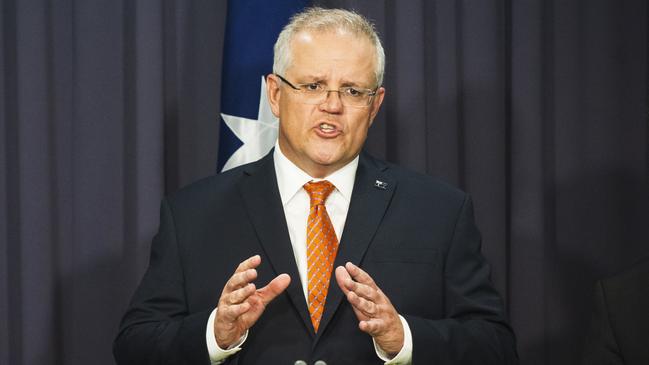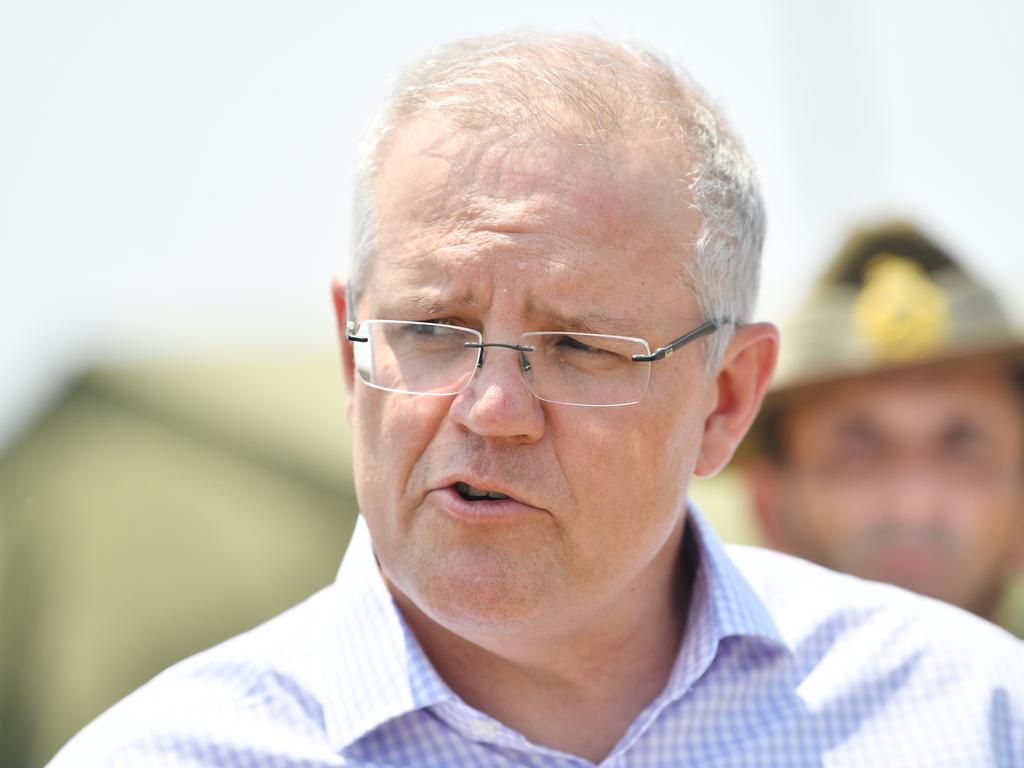Bushfires: Scott Morrison signals climate shift, deeper cuts
Scott Morrison has vowed deeper cuts to carbon emissions and to help Australians adapt to a ‘hotter, drier’ environment.

Scott Morrison has signalled a shift in the federal government’s approach to climate change, vowing to make deeper cuts to carbon emissions and help Australians adapt to a “hotter, drier” environment, as he prepares to call a sweeping royal commission into the bushfires crisis.
The Prime Minister also claimed the government may not need to use Kyoto carry-over credits to “meet and beat” its 2030 emissions reduction target, as he came under increasing pressure at home and overseas to adopt more ambitious commitments.
While Mr Morrison confirmed he would not revisit the government’s policy of a 26-28 per cent cut in emissions by 2030, he said policies would “evolve” to reduce emissions “even further”.
“We’re going to do it without a carbon tax, without putting up electricity prices, without shutting down traditional industries upon which regional Australians depend for their very livelihood. That’s what I took to the Australian people,” he told the ABC.
A royal commission into the disastrous bushfire season, which has killed at least 26 people, destroyed more than 2000 homes and burned millions of hectares of land, is all but certain after Mr Morrison declared such an inquiry was “necessary”. He is working on a proposal to put to cabinet.
The Australian understands Mr Morrison wants initial recommendations from the royal commission to be made before the next bushfire season, but it is unclear when the inquiry will begin.
The royal commission will require signoff from the states.
It will look at the responses of the federal and state governments to the bushfires, the Australian Defence Force’s involvement, a potentially new role for the commonwealth after it issued a compulsory callout of 3000 reservists, as well as emissions reduction policies and the effects of climate change.
Mr Morrison said the government’s response to climate change had three elements — emissions reduction, improving the country’s resilience and adapting to extreme weather.
“That isn’t just about bushfires, I should stress. That applies equally to floods. It applies to cyclones and other forms of natural disasters,” Mr Morrison said.
“The climate we are living in now and will live in for the next 10 years, the advice is hotter, dryer, longer seasons and, with that, understanding what the implications of that are for assisting us at a federal and state level, to build our resilience to deal with that new environment and that will continue to change going forward.”
The emphasis on not using Kyoto carry-over credits — an overachievement of emissions reduction of 411 million tonnes under Australia’s 2020 target — to deliver the government’s commitments under the Paris Agreement signals a shift in language from Mr Morrison.
Government sources said it was simply a statement of fact that carry-over credits would not be required if emissions were adequately reduced through other means. Australia emits 1.23 per cent of global emissions. “We could close down every single power generation facility in the country and those emissions would be taken up by China in about nine days,” Mr Morrison said.
Using carry-over credits from the Kyoto Protocol is controversial and has been rejected by Labor, with Anthony Albanese slamming the move as an “accounting trick” to reduce emissions. “They’re not going to meet the (2030) target, that’s the truth, which is why they went to Madrid and argued for an accounting trick in order to fiddle the numbers,” the Opposition Leader said.
“The government doesn’t have a climate policy, so it’s not a matter of tweaking it. There’s a need for them to get one … Good policy on climate change will create jobs, will lower emissions, and lower energy prices.”
Faced with a partyroom divided over climate change and its impact on Australia, Mr Morrison is focusing on practical adaptation and resilience measures. “Building dams is key to that. Native vegetation management is key to that. Land clearing is key to that. Where you can build homes is key to that. And that is as much a climate change response as emissions reduction,” Mr Morrison said.
Queensland Nationals MP George Christensen rejected the notion that climate change sparked bushfires, declaring climate change was “not a bogey man who can go around lighting bushfires”.
Liberal backbencher Craig Kelly was rebuked last week for failing to acknowledge the link between climate change and the bushfires, while Deputy Prime Minister Michael McCormack has slammed the climate change concerns of “woke capital city greenies”.
Former prime minister Malcolm Turnbull used an opinion piece for the Guardian Australia website to call for electricity to come from zero-emission sources this decade.
“Above all we have to face this fact; coal is on the way out. It is, as we are seeing today, a matter of life and death. Whether we like it or not, demand for our export coal is going to decline and expire,” Mr Turnbull said. “The world must, and I believe will, stop burning coal if we are to avoid the worst consequences of global warming. And the sooner the better.”
Mr Morrison dismissed Mr Turnbull’s push for the government to reinstate the national energy guarantee with higher targets, saying “that’s Malcolm’s view”.
The NSW Rural Fire Service urged tourists to return to the state’s south coast on the weekend after the US upgraded its travel advice for Australia, saying travellers should “exercise increased caution” due to the bushfires.
Mr Morrison said he had been in contact with senior US government officials in response to the travel advice.
Mr Albanese said Mr Morrison should give Labor input into who leads the bushfires royal commission, suggesting former High Court chief justice Robert French would be a good fit.
He warned that the inquiry should not be used by the government to deflect answers on its performance and policies.
A series of roundtables will be convened this week between ministers and industry bodies in the areas of health, small business, tourism, agriculture, science and the environment as part of the government’s bushfires response.
Mr Morrison and Health Minister Greg Hunt announced $76m on Sunday to fund free counselling sessions, extra Medicare and telehealth consultations and expand Headspace mental health services for young Australians in fire-affected communities.








To join the conversation, please log in. Don't have an account? Register
Join the conversation, you are commenting as Logout